The Protestant Church in the Netherlands is the largest Protestant denomination in the Netherlands, being both Calvinist and Lutheran.

Afrikaner Calvinism is a cultural and religious development among Afrikaners that combined elements of seventeenth-century Calvinist doctrine with a "chosen people" ideology based in the Bible. It had origins in ideas espoused in the Old Testament of the Jews as the chosen people.

The Anti-Revolutionary Party was a Protestant conservative and Christian democratic political party in the Netherlands. The party was founded in 1879 by Abraham Kuyper, a neo-Calvinist theologian and minister. In 1980 the party merged with the Catholic People's Party (KVP) and the Christian Historical Union (CHU) to form the Christian Democratic Appeal (CDA).
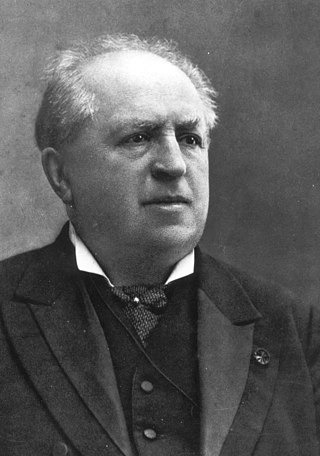
Abraham Kuyper was the Prime Minister of the Netherlands between 1901 and 1905, an influential neo-Calvinist pastor and a journalist. He established the Reformed Churches in the Netherlands, which upon its foundation became the second largest Reformed denomination in the country behind the state-supported Dutch Reformed Church.

The Christian Reformed Church in North America is a Protestant Calvinist Christian denomination in the United States and Canada. Having roots in the Dutch Reformed Church of the Netherlands, the Christian Reformed Church was founded by Dutch immigrants in 1857 and is theologically Calvinist.
The Dutch Reformed Church was the largest Christian denomination in the Netherlands from the onset of the Protestant Reformation in the 16th century until 1930. It was the traditional denomination of the Dutch royal family and the foremost Protestant denomination until 2004, the year it helped found and merged into the Protestant Church in the Netherlands. It was the larger of the two major Reformed denominations, after the Reformed Churches in the Netherlands was founded in 1892. It spread to the United States, South Africa, Indonesia, Sri Lanka, Brazil, and various other world regions through Dutch colonization. Allegiance to the Dutch Reformed Church was a common feature among Dutch immigrant communities around the world and became a crucial part of Afrikaner nationalism in South Africa.

The history of religion in the Netherlands has been characterized by considerable diversity of religious thought and practice. From 1600 until the second half of the 20th century, the north and west had embraced the Protestant Reformation and were Calvinist. The southeast was predominately Catholic. Associated with immigration from Arab world of the 20th century, Muslims and other minority religions were concentrated in ethnic neighborhoods in the cities.

Protestant Theological University is a theological university with locations in the Dutch city of Utrecht. The Protestant Theological University primarily caters for ministerial education and as such is one of three institutes recognised by the PKN, but it is also possible to study general (Calvinist) theology without wishing to become a minister.
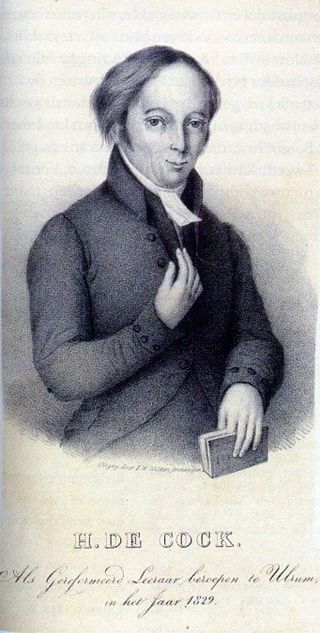
Hendrik de Cock was a Dutch minister responsible for the 1834–35 Dutch Reformed Church split due to his incarceration and suspension from office for his Calvinist convictions.
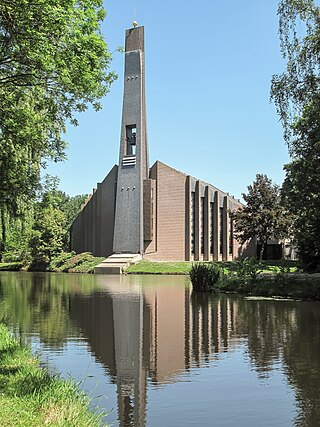
The Christian Reformed Churches in the Netherlands is a Protestant church in the Netherlands.
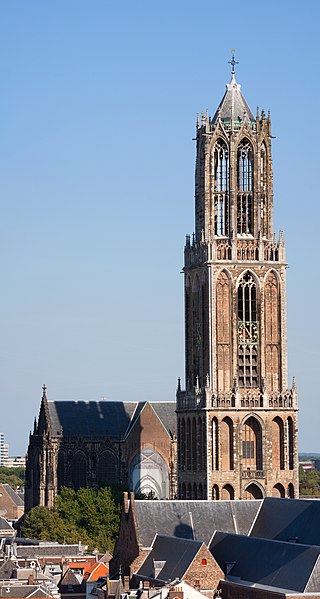
Religion in the Netherlands was dominated by Christianity between the 10th and 20th centuries. In the late 19th century, roughly 60% of the population was Calvinist and 35% was Catholic. Also, until the Holocaust, there was a noticeable Jewish minority. Since world war II, there has been a significant decline in Catholic and especially Protestant Christianity, with Protestantism declining to such a degree that Catholicism became the foremost form of the Christian religion. The majority of the Dutch population is secular. Relatively sizable Muslim and Hindu minorities also exist.

Klaas Schilder was a Dutch Neo-Calvinist theologian and professor in the Reformed Churches in the Netherlands and later in the Reformed Churches in the Netherlands (liberated).

The Reformed Churches in the Netherlands (Liberated) (Dutch: Gereformeerde Kerken in Nederland (vrijgemaakt)) was an orthodox Calvinist federation of churches. This church body arose in 1944 out of the so-called Liberation (Vrijmaking) from the Reformed Churches in the Netherlands, when many pastors and members refused to go along with the General Synod's demand to hold to "presumed regeneration of infants" at their baptism. Klaas Schilder played an important role in the Liberation. There were 270 affiliated local congregations with a total of about 120,000 members in 2016.

Protestantism in South Africa accounted for 73.2% of the population in 2010. Approximately 81% of South Africans are Christian and 5 out of 6 Christians are Protestant. Later censuses do not ask for citizens’ religious affiliations. Estimates in 2017 suggested that 62.5% of the population are Protestant.
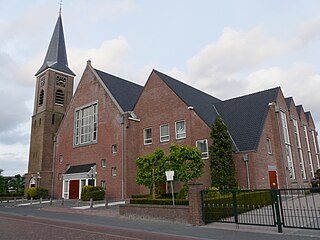
The Restored Reformed Church is a Calvinist denomination in the Netherlands. It was founded in 2004, from congregations which made up the orthodox-reformed wing of the Dutch Reformed Church; they had previously been part of groups named Het Gekrookte Riet and the still existing Gereformeerde Bond within the Dutch Reformed Church. The Church has grown steadily since its founding.
The 1886 Dutch Reformed Church split, also known as the Doleantie, was the name of a prominent schism in the Dutch Reformed Church that took place in 1886 and was led by a renowned minister, Abraham Kuyper. The Doleantie was not the first schism in the Dutch Reformed Church. Another schism, the Secession of 1834 (Afscheiding van 1834), had led to the formation of the Christian Reformed Church in the Netherlands.

The Reformed Congregations is a conservative Reformed church with 152 congregations in the Netherlands, 1 in Randburg, South Africa and 1 congregation in Carterton, New Zealand. The denomination has approximately 107,015 members as of 1 January 2024. It is Calvinist in theology. It is affiliated with the North American Netherlands Reformed Congregations.
The Reformed Churches (Restored) (Dutch: Gereformeerde Kerken in Nederland (hersteld)), also known as the New Liberated Churches (Dutch: Nieuwe Vrijgemaakte Kerken) constituted a Christian denomination in the Netherlands. It separated from the Reformed Churches in the Netherlands (Liberated) in 2003. Officially named the "Reformed Churches in the Netherlands", they were usually called the "Reformed Churches (Restored)" to avoid confusion with the Reformed Churches in the Netherlands (Liberated) and the Reformed Churches in the Netherlands (GKN).
The Reformed Association in the Protestant Church in the Netherlands is a confessional orthodox Calvinist group and movement within the Protestant Church in the Netherlands.

The Dutch Reformed Churches is a Reformed Christian denomination, formed on May 1, 2023 as a merger of the Reformed Churches in the Netherlands (Liberated) and Netherlands Reformed Churches.















